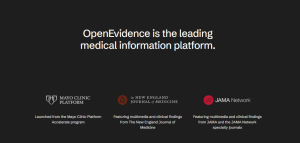
OpenEvidence is an AI-powered medical search platform reshaping the way clinicians engage with evidence-based medicine. Developed as part of the Mayo Clinic Platform Accelerate program, OpenEvidence is guided by a transformative mission: to organize, democratize, and make the world’s medical knowledge more accessible, useful, and understandable for healthcare professionals.
Unlike traditional search tools, OpenEvidence was purpose-built for medicine. It merges advanced natural language processing (NLP) with a real-time evidence retrieval engine, helping clinicians access the most relevant, current, and peer-reviewed medical data—quickly and transparently. Its foundation is a Retrieval-Augmented Generation (RAG) model that updates daily, ensuring each insight is grounded in the latest literature.
In a landmark achievement, OpenEvidence became the first AI system to score above 90% on the United States Medical Licensing Examination (USMLE), affirming its ability to process and apply complex clinical information at the level of a trained physician.
At the heart of the platform’s development is Dr. Wisit Cheungpasitporn, Professor of Medicine in the Division of Nephrology and Hypertension at Mayo Clinic, Minnesota. A leader in nephrology and digital health innovation, Dr. Cheungpasitporn has helped shape OpenEvidence into a trusted tool that enhances clinical reasoning and supports real-time medical decision-making.
Artificial Intelligence & Medicine presents the future of AI in healthcare – and the critical role of tools like OpenEvidence. This will be explored in depth at the 3rd Conference on Artificial Intelligence & Medicine (organised by Dr Marvin Edeas and Dr Jean-René Larue) which will be held on November 20-21, 2025 in Paris, France. Dr. Cheungpasitporn will share insights into the platform’s development, clinical integration, and future directions during his keynote session.